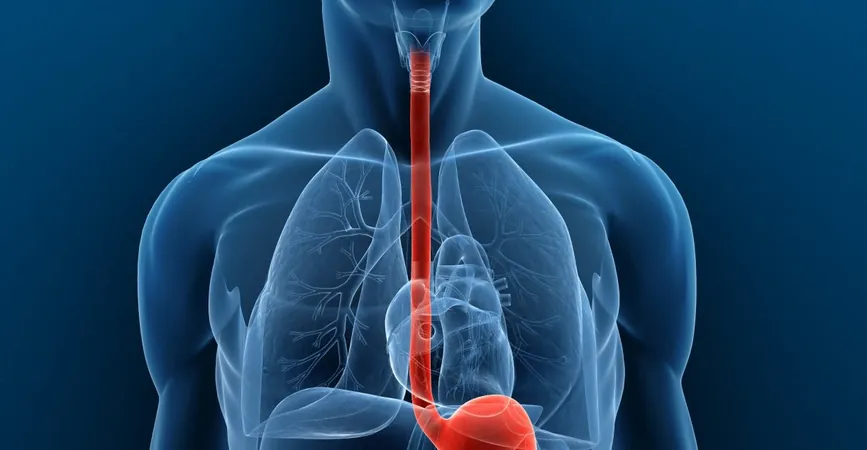
Discover How Tract Bio is Revolutionizing Oesophageal Cancer Treatment!
2025-03-26
Author: John Tan
Discover How Tract Bio is Revolutionizing Oesophageal Cancer Treatment!
In a groundbreaking study, Tract Bio has unveiled critical insights into the progression of oesophageal adenocarcinoma (EAC), one of the most aggressive forms of cancer. Through innovative research techniques, the company has identified promising drug combinations that could drastically enhance treatment effectiveness for patients battling this deadly disease.
Tract Bio, renowned for its commitment to developing novel therapies for cancer and inflammatory conditions, recently published a significant piece of preclinical research in the esteemed journal Gastroenterology. This study, aptly titled “Evolution of Oesophageal Adenocarcinoma from Precursor Lesion Stem Cells,” sheds light on the complex evolution of EAC, detailing how it emerges from precursor lesions, namely Barrett’s oesophagus (BE), low-grade dysplasia (LGD), and high-grade dysplasia (HGD).
Unlocking the Secrets of EAC Evolution
EAC is notorious for its rapid progression, evolving through various stages of precursor lesions that pose significant challenges in treatment. Tract Bio's state-of-the-art stemECHO epithelial stem cell cloning technology enabled researchers to isolate pivotal regenerative stem cells from epithelial tissues. This revolutionary method allowed for an in-depth genetic examination, highlighting key therapeutic targets within the cancer's evolutionary pathway.
The research found that distinct populations of clonogenic cells exist within each type of precursor lesion, presenting new avenues for targeted therapies. By conducting DNA sequencing on these clones, scientists revealed a fascinating landscape of clonal mutations across patients with BE, LGD, HGD, and EAC, showcasing the intralesional heterogeneity in cancer evolution.
Furthermore, high-throughput chemical screenings performed on stem cells derived from Barrett’s oesophagus hinted at effective drug combinations that show promise against not only BE but also LGD, HGD, and EAC. The result? The development of synthetic lethal drug combinations that successfully target EAC and its precursors, while simultaneously supporting the survival of normal oesophageal stem cells.
Expert Insights into the Breakthrough
Dr. Frank McKeon, Interim Chief Scientific Officer of Tract Bio, emphasized the revolutionary implications of the study, stating, “EAC, like all metastatic cancers, evolves through a series of precursor lesions. Our proprietary stemECHO platform allowed us to clone epithelial stem cells while maintaining genetic integrity, facilitating an unprecedented understanding of the underlying mechanisms.”
Richard Russell, the CEO of Tract Bio, further amplified the significance of these findings. He noted, “The clonogenic cells in all the regenerative lesions we explored—BE, LGD, HGD, and EAC—exhibit the functional properties of stem cells. These lesional stem cells could represent crucial therapeutic targets in tumors, reflecting their role in tissue regeneration.”
The Future of Cancer Treatment is Here!
These groundbreaking findings not only enhance our understanding of EAC but also pave the way for the discovery of new treatments aimed directly at combating this formidable cancer. Tract Bio is on the brink of unveiling advanced clinical applications that could transform the landscape for patients dealing with this aggressive disease.
As Tract Bio forges ahead with its research and development, the potential for pioneering therapies and enhanced clinical outcomes for epithelial cancers becomes more and more tangible. The fight against oesophageal cancer is entering a new era of hope and innovation—are you ready to witness the future of cancer treatment? Stay tuned as this captivating journey unfolds!
 Brasil (PT)
Brasil (PT)
 Canada (EN)
Canada (EN)
 Chile (ES)
Chile (ES)
 Česko (CS)
Česko (CS)
 대한민국 (KO)
대한민국 (KO)
 España (ES)
España (ES)
 France (FR)
France (FR)
 Hong Kong (EN)
Hong Kong (EN)
 Italia (IT)
Italia (IT)
 日本 (JA)
日本 (JA)
 Magyarország (HU)
Magyarország (HU)
 Norge (NO)
Norge (NO)
 Polska (PL)
Polska (PL)
 Schweiz (DE)
Schweiz (DE)
 Singapore (EN)
Singapore (EN)
 Sverige (SV)
Sverige (SV)
 Suomi (FI)
Suomi (FI)
 Türkiye (TR)
Türkiye (TR)
 الإمارات العربية المتحدة (AR)
الإمارات العربية المتحدة (AR)